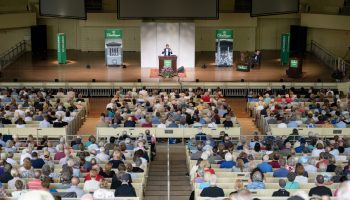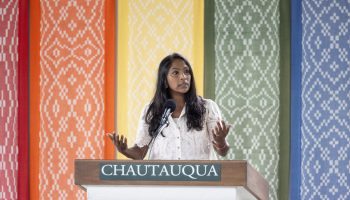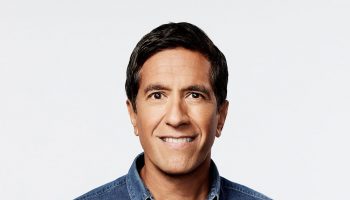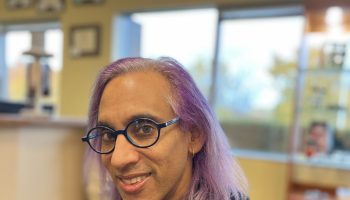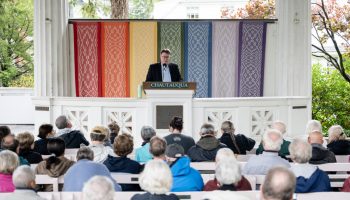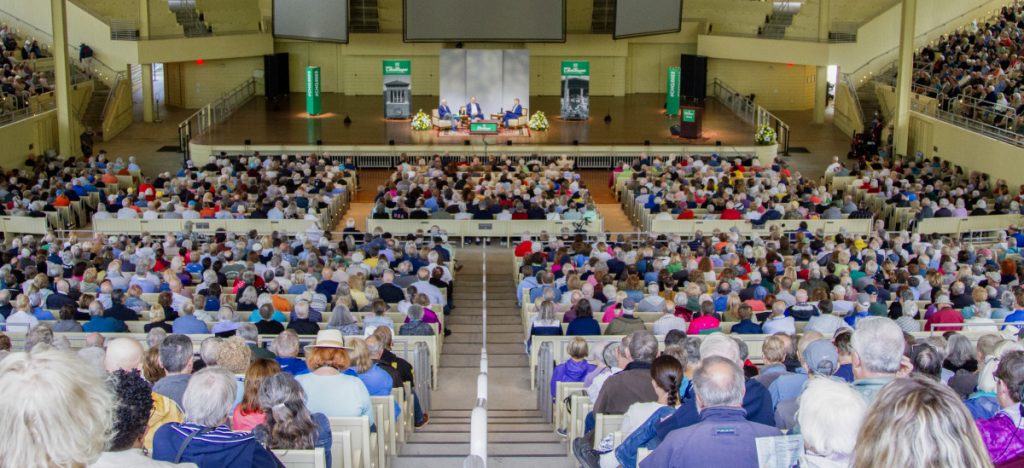
Alton Northup
Staff writer
David Axelrod and Karl Rove have both held the position of senior adviser to the president, albeit with radically different administrations; Axelrod served under President Barack Obama, while Rove served under President George W. Bush.
The two are somewhat of an odd couple, but share a bond deeper than politics. After Rove published his memoir, Courage and Consequence: My Life as a Conservative in the Fight, where he shared the fallout from his mother’s suicide, Axelrod reached out to share the story of his father’s suicide.
“It’s important to remember that we share a common humanity,” Axelrod said. “Whether you’re a Republican or a Democrat, there are bigger things than that.”
The two, in conversation with Chautauqua Institution President Michael E. Hill, closed the Chautauqua Lecture Series Week Eight theme, “Freedom of Expression, Imagination, and the Resilience of Democracy,” at 10:45 a.m. Friday in the Amphitheater.
In a time when it feels as if common ground is hard to find, it may surprise people to see political opposites standing firm together. But Axelrod said civil discourse requires a willingness to probe ideas and the knowledge that nobody is infallible.
“The great challenge today is that there are powerful, powerful forces that profit from division,” he said.
Social media platforms, Axelrod said, use algorithms to feed content to users that places them into silos “in which our views are sometimes informed and always affirmed.” This echo chamber can lead people to believe those who do not share their beliefs are un-American, he said.
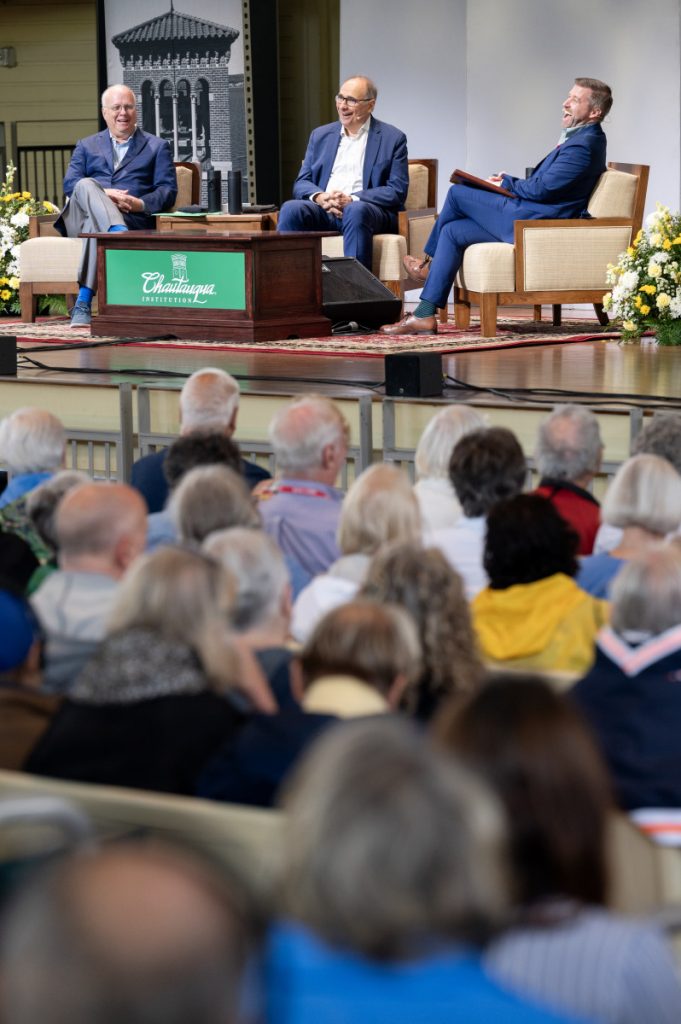
What makes this technology particularly dangerous is it chooses the user, and it is developing quicker than society can understand. As outrage traffics money, Axelrod said he is concerned about the threat technology poses to the rules and norms of society.
At a time of political vitriol, Rove called back to days when crisis plagued the country.
In the 1960s and ’70s, the country looked as if it would fall apart amid an unpopular war, he said. In the 1930s, extreme views dominated political parties during record unemployment. In 1838, U.S. Rep. Jonathan Cilley died in a duel with U.S. Rep. William J. Graves, and during the Gilded Age, two presidents were elected without the popular vote.
The advent of the printing press brought an influx of daily newspapers that people could choose from, radio offered an even greater diversity in partisan content, and television ushered in a new era of political commentary — but democracy was sustained.
“Our politics are broken today, no ifs, ands or buts, … but it has been that way before,” Rove said.
Axelrod said he has faith in the democratic system, but it gets tested every day. Despite razor-thin margins in Congress, lawmakers have worked together several times in recent years to pass landmark legislation, such as the Infrastructure Investment and Jobs Act.
Rove pointed to the Bipartisan Safer Communities Act, which he called the most crucial gun control legislation so far. He said that more than any of his colleagues, U.S. Sen. John Cornyn (R-TX) is responsible for rallying bipartisan support in Congress.
“Compromise is absolutely necessary to a functioning democracy,” Axelrod said.
Even as popular voices attempt to stifle democracy, the institutions designed to protect it still work, Rove said. After the Jan. 6, 2021, attack on the U.S. Capitol, citizens worked to identify people documented participating in the attack, courts have tried suspects and Congress still carried out the counting of electoral votes.
“Our institutions are stronger than our confidence in them,” he said.
However, the two recognized that Congress often fails to pass policies popular with a majority of the country. For example, 90% of the country supports universal background checks, Axelrod said, yet legislation fails to reflect this.
Axelrod blamed this on the uncompetitive nature of congressional elections, and said many districts are decided in primaries.
But Rove defended the apprehension on the part of Congress to pass legislation on the issue, and noted the United States. has a federalist government. He said decision-making should be left to state and local governments to reflect the values of voters.
“We’ve got to be careful about believing that government can solve all of our problems,” Rove said.
Axelrod, who lives in Chicago, said because Illinois has some of the strictest gun control laws in the country, nearly half of the city’s firearms come from Indiana. While he has confidence in local governments to represent constituents, he called for solutions that respect states’ decisions, but protect all.
“There are limits to federalism when the welfare of people generally are impacted,” he said.
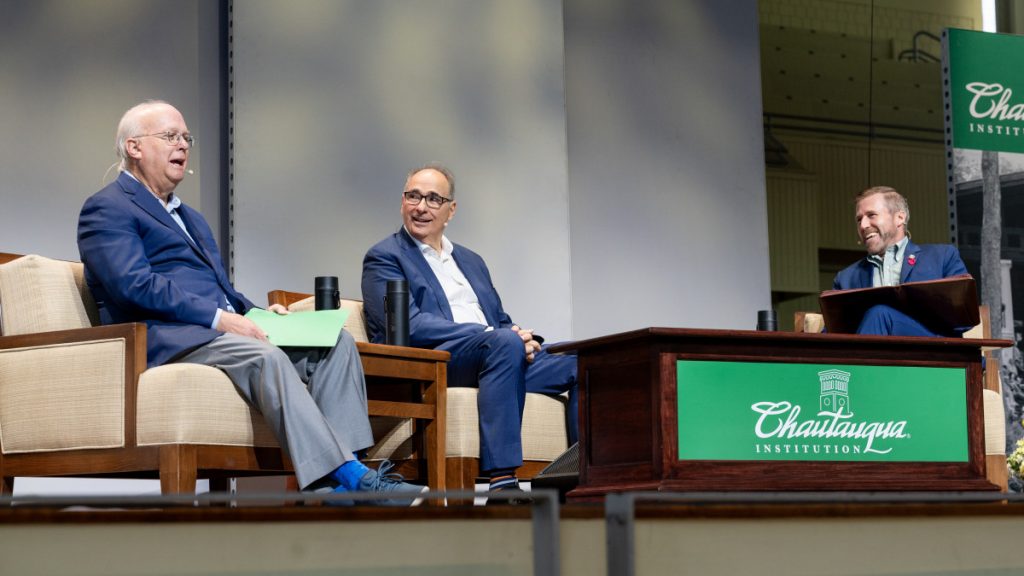
Among the most staunch advocates against federalism are young voters, who both Axelrod and Rove agree campaigns should engage.
After leaving politics, Axelrod started the bipartisan Institute of Politics at the University of Chicago because he didn’t want to stop interacting with young people in the political world. As senior strategist for Obama’s 2012 re-election campaign, he met young voters who he described as skeptical but not cynical, and full of idealism.
However, he observed that many young people have lost faith in the electoral system and instead often will opt for other tools for change, such as non-governmental organizations. But he implores his students to focus on Washington and state legislatures because the issues they care about will ultimately be decided there.
“Democracy is our chance to grab the wheel of history and turn it in the right direction,” he said. “They want to be part of that process, and I want to inspire young people to do that.”
For 32 years, Rove said, the Greatest Generation occupied the White House, ending with George H.W. Bush. Now, the Baby Boomers have also ruled for 32 years. He said neither an 82-year-old President Joe Biden, nor an 82-year-old President Donald Trump, serve the future of the country.
In preparing the next generation of leaders, Axelrod said the University of Chicago, where he serves a senior fellow and chair of its advisory board, instills in its students a commitment to free speech. The university has welcomed several controversial speakers, some of which resulted in student-led protests, but he said engaging in ideas remains important for their education and democracy.
“We need to serve our young people better by helping them be strong and help them learn the art of listening and evaluating, rather than walling themselves off from ideas they find distasteful,” Axelrod said.

